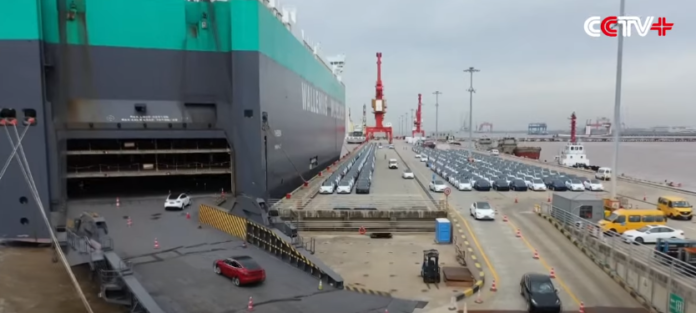
-
Shanghai factories crank up as COVID infections wane
-
Tesla sends second shipload of electric cars to Europe in a week as automaker delays ramp up plan for another week
-
Local rival SAIC relaunches business with plans to ramp up to pre-epidemic levels soon
-
More than 1,800 factories plan to lift production to make up for pandemic losses
Shanghai factories are cranking up as COVID infections wane. On May 15, more than 4,000 electric cars were driven onto a Wallenius Lines car carrier at Shanghai’s Nangang Wharf No. 5 for shipment to the Port of Zeebrugge in Belgium, China’s CCTV reported.
Major enterprises in the eastern Chinese metropolis are resuming stable production as key industrial chains, such as makers of cars, integrated circuits and biomedicine, continued to recover and ramp up production, with COVID-19 epidemic in Shanghai gradually waning.
Shanghai recorded 759 new local asymptomatic cases and 96 confirmed symptomatic cases, up from 77 on Tuesday, but no new cases outside quarantined areas for a fourth day.
Tesla’s shipment last Sunday was the second batch of cars produced at its Shanghai Giga factory that it exported less than a month since the US carmaker resumed production on April 19 after 22 days of lockdown imposed by city authorities to contain an Omicron wave of infections.
Four days earlier, Tesla shipped the first batch of 4,767 electric cars to Slovenia in Eastern Europe, Xinhua reported, quoting Shanghai customs.
Tesla has delayed by about a week a ramp-up of its Shanghai No. 3 plant back to pre-lockdown levels ostensibly on manpower issues, said an internal memo seen by Reuters. The agency said Tesla is not raising its daily output to 2,600 cars until at least May 23.
Despite COVID-19 interrupting its production, Tesla had delivered 180,000 cars in the first four months this year, over 1.7 times the number for the same period last year and beating its whole-year output in 2020, Xinhua said.
Tesla, meanwhile, said its Shanghai factory has already started manufacturing vehicles for export to the Asia-Pacific and European markets.
“We believe that the epidemic situation is only a short test and challenge. We have seen the capacity of all sectors to cope with the challenges in the process of resuming work,” said Tao Lin, vice-president of Tesla. “We believe that production will soon return to normal.”
At rival SAIC Motor’s vehicle production bases also in Shanghai, single-shift output resumed on April 29. China’s largest carmaker said before the Omicron contagion that it would further expand this year its European market, where it plans to export its self-owned brands MG and Maxus.
Wang Xiaoqiu, president of SAIC, was quoted by The Paper.cn online news portal as telling shareholders on May 5 that, with the gradual recovery of supply and logistics chains, the carmaker is working hard to make up for its losses during the outbreak.
“Strictly following the epidemic prevention and control rules, we are relaunching our business at an accelerated pace, trying to increase capacity to the pre-epidemic level as soon as possible,” Wang said. SAIC’s Shanghai capacity makes up about 30% of the group’s total output, he said.
As of April 29, about 2,400 vehicles had left SAIC’s restarted assembly line in Lingang on the southeastern fringes of Shanghai, said Chen Peifeng, a factory director.
“Our daily capacity currently amounts to about 300 vehicles, a rise of some 50% from the stress tests period,” Chen said.
On April 19, some 1,800 export-oriented factories around Shanghai cranked up after the government allowed industries to resume production in a closed-loop shift, where workers stay in the factory compound to work one shift a day, Xinhua said.
US manufacturer 3M’s four factories in Shanghai had resumed production by Saturday, the company said, adding that it will continue to improve its production capacity.
Since the resurgence of COVID-19 cases in March, 3M has not suspended its East China Distribution Center and the production of medical protective masks at its Caohejing base to ensure the stable supply of anti-epidemic materials.
Meanwhile, China has become an aluminum exporter as Russia’s invasion of Ukraine as supplies of the metal flow to Europe where it fetches higher prices, Japanese newspaper Nikkei reported.
China exported 26,378 tons of aluminum ingots in February, a more than 500% increase from January, said Nikkei, citing customs data. Imports fell 53% on the month to 18,343 tons, surpassed by exports for the first time since November 2019.
Aluminum soared on the London Metals Exchange, with the three-month contract peaking at US$4,000 a ton in March. Prices have since settled in the US$3,300 range.




